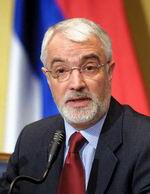- Serbia
Get to know Serbia
- Citizens
Culture and science
Health services
Pension and disability insurance
- Business
Employment
Economy
- Media
- Government
- Contact
Keep in touch
Contact form
Back
Keepin touch
Whether you have a question, comment, suggestion or any problem in the purview of the government, send us your message and we will try to respond as soon as possible. If your problem is not in our purview, we will forward your message to the relevant institution.
Q:
A:
Serbia's education system will not undergo drastic changes
Belgrade,
13 May 2004
Serbian Deputy Prime Minister Miroljub Labus said last night that the Bill on amendments to the Law on education, adopted by the Serbian government and forwarded to the Serbian parliament for immediate discussion, will not bring drastic changes to the educational system.
Labus told the state-run Radio Television Serbia that the first grade of the elementary school has been reformed and that that changes will be applied in practice, while the reform of the second grade will not be implemented because the necessary preparations have not been made. The new textbooks have still not been prepared, and teachers have not been trained. Labus said that the seventh grade should also be reformed, but the plan does not exist and therefore cannot be applied.
The Deputy Prime Minister said that the Bill mandates the setting up of a national education council, which will have greater jurisdiction than the previous one. Apart from the educational strategy, the new council will prepare curricula and textbooks. It will set standards and have many more functions.
The council will include people who know what education means and who will be authorised to be at the head of that system, Labus said, adding that the national education council will be elected in the parliament. The first task of the council will be to work out an educational strategy, which currently does not exist.
Speaking about the sugar affair, Labus said that the police findings indicate that some domestic sugar refineries exported sugar which was previously imported from the European Union. These allegations must be investigated thoroughly so that the preferential rates for the sugar export could be returned to Serbia.
Labus said that the announced rise in the prices of electricity and petrol will not trigger inflation growth, adding that inflation rate for this year will remain within the projected 8.5 percent.
The Deputy Prime Minister stressed that the cooperation with the Hague tribunal is Serbia's legal obligation, adding that it will be continued following the formation of a national council for cooperation with the tribunal.
The Deputy Prime Minister said that the Bill mandates the setting up of a national education council, which will have greater jurisdiction than the previous one. Apart from the educational strategy, the new council will prepare curricula and textbooks. It will set standards and have many more functions.
The council will include people who know what education means and who will be authorised to be at the head of that system, Labus said, adding that the national education council will be elected in the parliament. The first task of the council will be to work out an educational strategy, which currently does not exist.
Speaking about the sugar affair, Labus said that the police findings indicate that some domestic sugar refineries exported sugar which was previously imported from the European Union. These allegations must be investigated thoroughly so that the preferential rates for the sugar export could be returned to Serbia.
Labus said that the announced rise in the prices of electricity and petrol will not trigger inflation growth, adding that inflation rate for this year will remain within the projected 8.5 percent.
The Deputy Prime Minister stressed that the cooperation with the Hague tribunal is Serbia's legal obligation, adding that it will be continued following the formation of a national council for cooperation with the tribunal.
-
 Belgrade/Brussels, 19 November 2025
Belgrade/Brussels, 19 November 2025European integration shared responsibility of entire society
-
 Belgrade, 29 October 2024
Belgrade, 29 October 2024State moves to minimise advertising for betting shops
-
 Belgrade/Berlin, 28 January 2016
Belgrade/Berlin, 28 January 2016Fences cannot stop migrations
-
 Belgrade, 7 January 2016
Belgrade, 7 January 2016Serbia to experience dynamic economic growth in 2016
-
 Belgrade, 31 December 2015
Belgrade, 31 December 2015Serbia will persevere on path of development, reforms
-
 Belgrade, 30 December 2015
Belgrade, 30 December 2015Ground for Serbia’s progress set
-
 Belgrade, 28 December 2015
Belgrade, 28 December 2015Serbia ready for improvement of cooperation with Russia
-
 Belgrade, 22 December 2015
Belgrade, 22 December 2015Serbia ready to open six more chapters next year
-
 Belgrade, 21 December 2015
Belgrade, 21 December 2015Serbia to be part of EU by 2020
-
 Belgrade, 20 December 2015
Belgrade, 20 December 2015Serbia ready for EU membership by 2019

